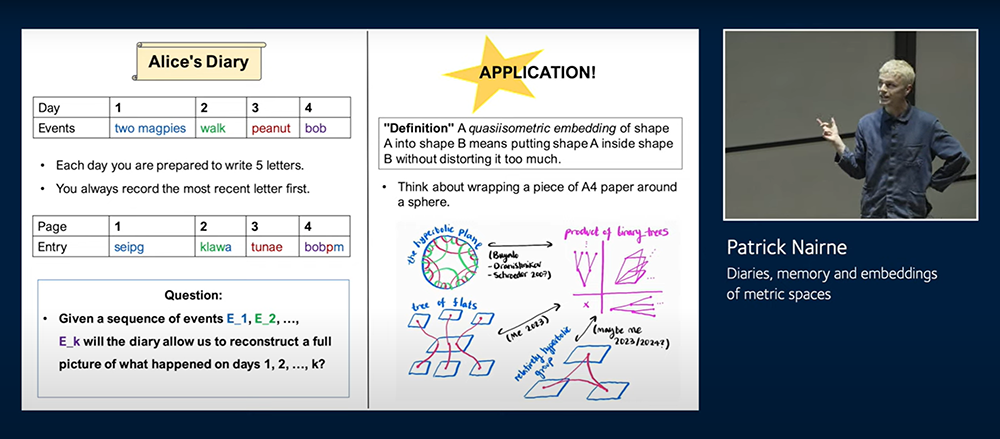Former Exeter lecturer Patrick Nairne wins Three-Minute Thesis competition
Patrick Nairne, a former Exeter College lecturer in mathematics and DPhil candidate under the supervision of Exeter College Fellow in Pure Mathematics Professor Cornelia Drutu, was recently named winner of an annual Three-Minute Thesis competition for his presentation “Diaries, memory, and embedding of metric spaces.”
The competition, hosted each year by Oxford’s Society for Industrial and Applied Mathematics (SIAM), challenges six DPhil students to present their dissertation works-in-progress in no more than three minutes, using nothing but a single slide of visual aid. Presentations are evaluated on criteria such as “clarity, pacing, enthusiasm, and impact,” and the winner is awarded a cash prize of £250.
Patrick’s presentation centred around an original application of a hypothetical scenario called “Alice’s Diary,” in which a diarist records the events of four days under severe time constraints. She only writes five letters per day, with the most recent being accounted for first. For example, if she spots two magpies on day one, her diary entry for the day will read “seipg,” the final five letters of “magpies” listed in the order of their most recent occurrence. This process plays itself out across all four of Alice’s days, yielding more complicated letter combinations. Day four, in which Alice visits her friend Bob, reads “bobpm,” the three-letter palindrome having been joined by letters left unrecorded on previous days.
Drawing on the work of mathematicians Bugalo, Dranishikov, and Schroeder, Patrick asked whether the diary entries, in their scrambled condition, provide enough information to fully reconstruct the events of all four days. The trio of mathematicians just mentioned used this process to, in Patrick’s words, “find a quasi-isometric embedding of the hyperbolic plane into a product of binary trees.” He helped his audience parse this tangle of technical terms with a series of illustrations on his visual aid.
Patrick uses this same process to “find a quasi-isometric embedding of the tree of flats into a product of binary trees” and, by the end of his DPhil, hopes “to find a quasi-isometric embedding of a relatively high-quality hyperbolic group or hyperbolic groups into products of binary trees.” He works within the field of geometric group theory, which his supervisor, Professor Drutu, is an expert in. Patrick also served as a lecturer at Exeter during the last academic year.
Some of the other projects Patrick presented alongside included “Mathematical models of filtration,” “Axiomatic approaches to field theory (algebraic and functional),” and “Parameter identifiability and experimental design for PDE models of cell invasion.” You can watch Patrick’s presentation, and those of his competitors, here.
Congratulations to Patrick for a fantastic presentation!

